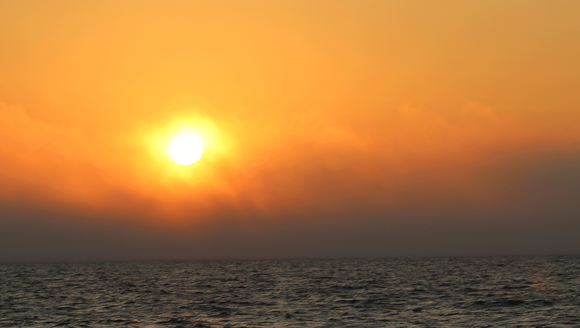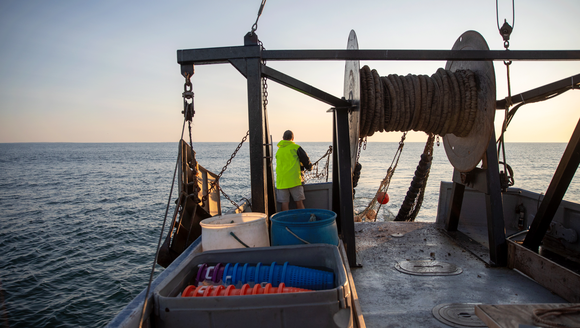Snap-a-Striper
Working together to protect striped bass in the Gulf of Maine.
Striped bass catches have declined dramatically in recent years — with landings down by 90%, according to some estimates — leaving both scientists and fishermen searching for answers. We've partnered with the Maine chapter of The Coastal Conservation Association to launch a citizen science initiative called Snap-a-Striper.
Snap-a-Striper Goals:
- Engage anglers as citizen science to address information gaps about striped bass life histories.
- Identify adaptive fishery management strategies to reverse the declining striped bass catch trend.
- Map out how changing temperatures in the Gulf of Maine influence striper abundance and distribution.
What: Snap-a-Striper is a data collection program aimed at 1) compiling photos of live release and legal keeper striped bass caught in Maine waters and 2) saving and freezing the heads of legally harvested keepers.
Who: Snap-a-Striper is a collaborative effort between the Gulf of Maine Research Institute, the Coastal Conservation Association - Maine, and local anglers and guides.
When: Snap-a-Striper is an ongoing program aimed at collecting valuable biological information from striped bass throughout the fishing season in Maine.
Why: Body shape data from every striper photo taken with a Snap-a-Striper data card in place, as well as data retrieved from otoliths (fish ear bones) collected from the heads of legally harvested stripers, can help fishery scientists determine the origin (local vs. migrant) of our fish, information that can improve management of the striped bass resource.
There isn't a lot of data available on Maine's striper population. Anglers are uniquely positioned to contribute the information needed to understand the dynamics of this local resource.
Lisa Kerr, Ph.D. Associate Professor, UMaine School of Marine Sciences![This is the staff photo for lisa kerr]() Lisa Kerr, Ph.D. Associate Professor, UMaine School of Marine Sciences
Lisa Kerr, Ph.D. Associate Professor, UMaine School of Marine Sciences
Here’s what Zach has to say about Snap-a-Striper:
Snap-a-Striper is a truly unique research project, and I feel lucky to be a part of it for a number of reasons. Here are just a few...
Catch and Release: As an angler, I’m a big fan of catch and release. As a scientist, I currently have to harvest and dissect the fish I study. The end goal of this project is that we’ll know where a striper comes from just by the shape of its body. All the data we’ll need will be in the fishermen’s photos. That means more fish in the ocean, and less in my lab.
Dealing with Climate Change: It’s so important for us scientists to know the effects of warming oceans on fish. This project will show us the status of Maine stripers now, so in the future we can compare changes in temperature to changes in the fish population.
Recreational anglers get a say: One of the coolest parts of the project is that local sportfishermen can engage in real science to protect a species we all love.
Local Jobs: I grew up making my living on the water, and I know how tough it can be. While stripers aren’t harvested commercially here in Maine, the recreational fishery supports jobs in tourism along our coast, from charter boats, to tackle shops, to bed and breakfasts.
Stripers are important in so many ways and the more we can learn about them, the better. I love this program, and can’t wait to take it to the next level. Oh, and if you haven’t had a chance to try striper fishing yourself – get out and try it this summer. And don’t forget to snap a photo for us!
Snap-a-Striper Team
-
![This is the staff photo for lisa kerr]()
Lisa Kerr, Ph.D.
Associate Professor, UMaine School of Marine Sciences
-
![]()
-
![]()
Read More
-
![Scientists, Anglers Partner to Research Striped Bass]()
Scientists, Anglers Partner to Research Striped Bass
This year, our Research team recruited anglers, fishing guides, and captains to participate in this study. In 2016, 44 of these citizen scientists helped compile …
Announcements
-
![Voices of the Gulf of Maine: The Charter Boat]()
Voices of the Gulf of Maine: The Charter Boat
For charter boat captain Carle Hildreth, recreational fishing is serious business. As owner of No Slack! Sportfishing, Carle helps his clients chase striped bass throughout …
Voices of the Gulf of Maine
-
![Demystifying the Blue Economy]()
Demystifying the Blue Economy
The blue economy is a hot topic these days, but the meaning behind the term isn't always clear. In this blog, we break down what …
Perspectives
-
![Fisheries 101]()
Fisheries 101
Fisheries are the backbone of our state's economy and cultural heritage, but these systems are complex, and managing them even more so. Read on for …
Perspectives



